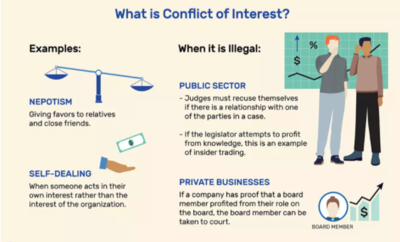Conflict of Interest
A Conflict of Interest occurs when an entity or individual becomes unreliable because of a clash between personal (or self-serving) interests and professional duties or responsibilities. Such a conflict occurs when a company or person has a vested interest — such as money, status, knowledge, relationships, or reputation — which puts into question whether their actions, judgment, and/or decision-making can be unbiased. When such a situation arises, the party is usually asked to remove themselves, and it is often legally required of them.[1]

source: the balance small business
Types of Conflict of Interest[2]
The following are the most common forms of conflicts of interest:
- Self-dealing, in which an official who controls an organization causes it to enter into a transaction with the official or with another organization that benefits the official only. The official is on both sides of the "deal."
- Outside employment, in which the interests of one job conflict with another.
- Nepotism, in which a spouse, child, or other close relative is employed (or applies for employment) by an individual, or where goods or services are purchased from a relative or from a firm controlled by a relative. To avoid nepotism in hiring, many employment applications ask if the applicant is related to a current company employee. This allows recusal if the employed relative has a role in the hiring process. If this is the case, the relative could then recuse from any hiring decisions.
- Gifts from friends who also do business with the person receiving the gifts or from individuals or corporations who do business with the organization where the gift recipient is employed. Such gifts may include non-tangible things of value, such as transportation and lodging.
- Pump and dump, in which a stockbroker who owns a security artificially inflates the price by "upgrading" it or spreading rumors, sells the security and adds a short position, then "downgrades" the security or spreads negative rumors to push the price down.
Other improper acts, sometimes classified as conflicts of interest, may have a better classification. For example, accepting bribes can be classified as corruption, using government or corporate property or assets for personal use is fraud, and unauthorized distribution of confidential information is a security breach. For these improper acts, there is no inherent conflict. COI is sometimes termed competition of interest rather than "conflict," emphasizing a connotation of the natural competition between valid interests—rather than the classical definition of conflict, which would include, by definition, a victim and unfair aggression. Nevertheless, this denotation of conflict of interest is not generally seen.
Is a Conflict of Interest a Crime[3]
Like other types of illegal or unethical activities, conflict of interest activities carry the risk of consequences. Federal and state laws have been set up to criminalize conflicts of interest in the public sector, and in certain circumstances, conflict of interest can result in prosecution. The federal government has a criminal conflict of interest statute that prohibits government employees from participating personally and substantially in official matters where they have a financial interest. The spouse, minor child, general partner, and certain others are also included in this prohibition. Potential conflicts of interest can arise from several sources:7
- Assets and investments
- Liabilities
- Private investment funds
- Business or farm ownership
- Corporate employment
- A law firm or consulting employment
- Employment with institutions of higher education and related research, speaking, and writing activities
- Penalties are fines of up to $10,000, prison for up to two years, or both.
See Also
